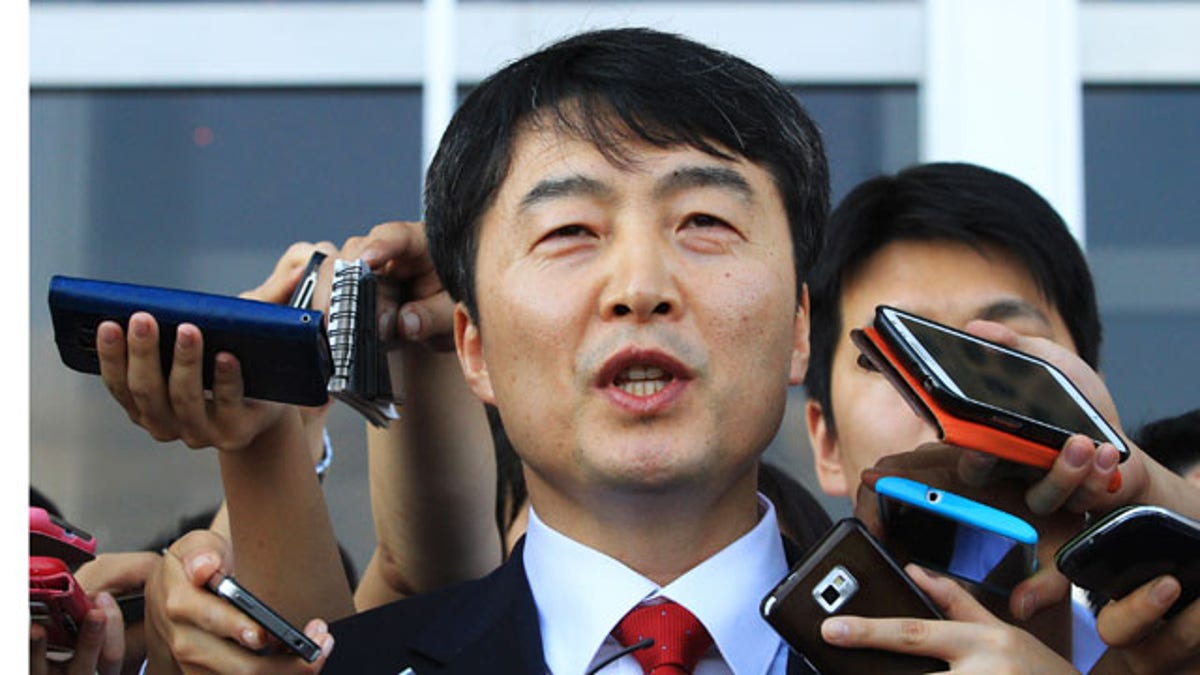
September 4, 2013: Rep. Lee Seok-ki of the leftist Unified Progressive Party speaks before leaving the National Assembly in Seoul, South Korea. South Korea’s parliament on Wednesday paved the way for the possible arrest of Lee accused of plotting to topple the government should a war with North Korea break out. (AP Photo)
SEOUL, South Korea – South Korea's National Assembly paved the way Wednesday for the possible arrest of a left-wing lawmaker who is facing the unusual accusation that he plotted to topple the country's democratically elected government if war broke out with North Korea.
At the heart of the alleged "leftist rebellion" is Lee Seok-ki, a first-time lawmaker from a small leftist party who has long been accused of pro-North Korean views.
The assembly overwhelmingly passed a proposal on Wednesday that would lift Lee's legislative immunity against arrest. A district court will now determine whether to issue an arrest warrant. It is believed to be the first time the assembly has passed such a motion over rebellion charges.
South Korea's spy agency accuses Lee of leading a secret May meeting of 130 members of his United Progressive Party aimed at attacking infrastructure if dueling threats between the Koreas this past spring had led to war. Lee was sentenced in 2003 to 2 1/2 years in prison for playing a part in a pro-North Korea organization but later granted amnesty.
There has been massive local media interest in the story, which reveals a still-bitter political rift between left and right that has roots in the fight against Japan's 1910-45 colonial rule of Korea and the division of the peninsula into U.S. and Soviet-backed halves after the end of World War II. It also raises real fears among some here that despite South Korea's powerhouse economy and hard-earned democracy, secret groups are working to hand North Korea's autocratic government control of the Korean Peninsula.
"If 130 people make determined efforts to destroy major facilities, they could wreak havoc on South Korean society and its economy," the Korea Herald newspaper wrote in an editorial Wednesday. "Furthermore, there could be other, still unidentified underground organizations under the control of Lee."
Critics, however, see the accusations as an attempt to distract from the intense criticism the spy agency faces over an alleged smear campaign during last year's presidential election. They point out that military dictatorships used the spy agency and charges of insurgency to suppress political dissidents until democracy took hold in the late 1980s. The plotters, they say, had few realistic plans to back up their talk of insurgency, instead discussing ways to make more powerful BB guns and searching Internet sites to find ways to build homemade bombs.
"These are the same rebellion charges that dictators used to destroy their political opponents and trample on democracy," Lee said in a floor speech ahead of the vote. "They are now being aimed at my neck."
Only a small fraction of South Koreans are now believed to support North Korea, which defies the international community over its weapons programs while struggling to feed most of its 24 million people.
Lee allegedly held his May meeting because of a belief that North Korea's announcement that it had nullified the fragile armistice that ended the 1950-53 Korean War indicated the possibility of imminent war. Tensions were unusually high during the spring. Seoul had vowed to retaliate against any attack by the North, which had threatened Seoul and Washington with nuclear and missile strikes, and the U.S. took the unusual step of sending nuclear-capable bombers to military drills with South Korea in a show of its resolve to protect its ally. The animosity has since eased, and the rival Koreas are in talks to restart stalled cooperative projects.
Last week, spy agency officials arrested three UPP members and raided the offices and houses of others for allegedly plotting an insurgency during the May meeting.
Lee and other party members say the government's accusations are largely fabricated and distorted to divert criticism over revelations that spy agents made Internet postings aimed at helping the conservative ruling party candidate win December's presidential election. The candidate, Park Geun-hye, eventually beat by a million votes her chief liberal rival, Moon Jae-in, who was supported by the UPP.
